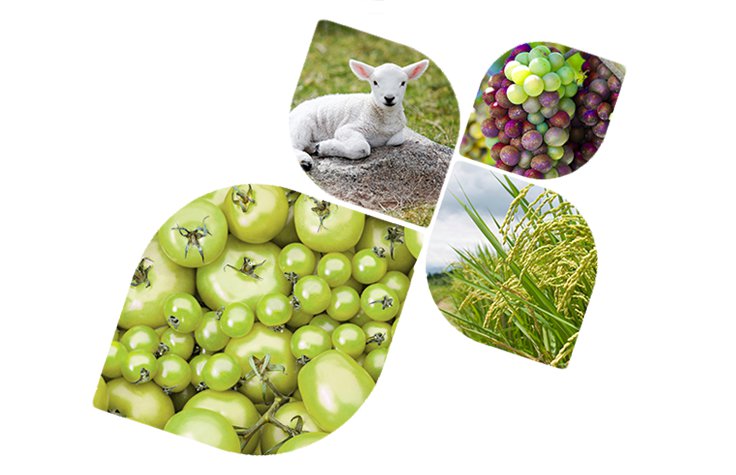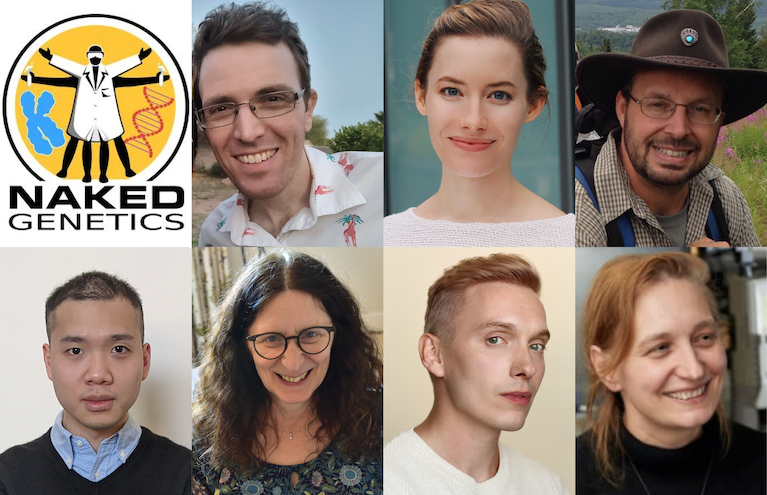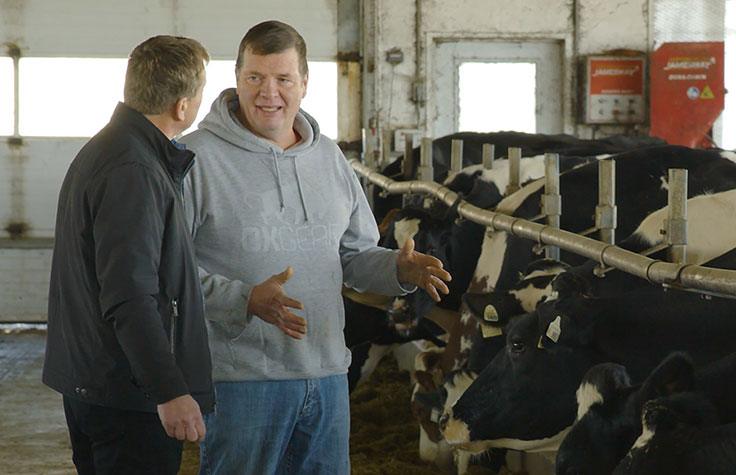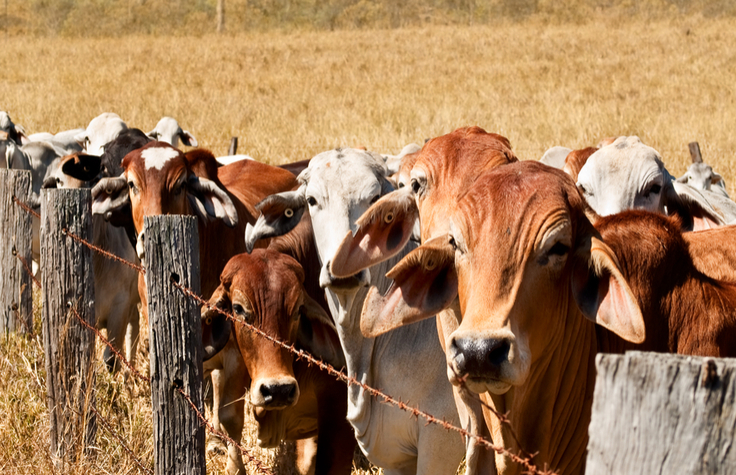Agriculture Consortia
Collaborating for Agricultural Research
With an agriculture consortium, members work together privately or publicly to advance the collective understanding of agrigenomics. Illumina has facilitated numerous collaborations between breeders and researchers to enable development of custom products for agriculturally relevant species. Our microarray technology is the foundation of many agriculture consortia products, including those developed for the species listed below.

Crops and Other Plants
RosBREED Apple Consortium
The apple genotyping panel was developed by RosBREED, a multi-institutional, multi-national project dedicated to the improvement of the Rosaceae crops using targeted genomics applications and tools to enhance the efficiency of breeding programs. The SNPs were developed for use on worldwide breeding germplasm and include Sanger-based eSNPs and SNPs identified from the paired end sequencing of 27 important founder accessions. The Community has provided a cluster file for the Apple Genotyping array suitable for fast automated analysis of all project sizes. This panel is suitable as base content for over 80,000 Add-On markers for a customized Apple genotyping array.
Ordering Information
Please contact us to place an order or for additional information.
Links to publications and information on the consortium
Support Links
- DesignStudio Microarray Assay Designer (Design and ordering of fully custom and semi-custom Infinium genotyping BeadChips)
Barley50K Consortium
The Barley 50K consortia array features ~44,000 SNPs derived from exome capture data of 170 carefully selected barley accessions. It covers genetic variation that exists among a wide range of European germplasm. The Barley 50K consortia array was designed by The James Hutton Institute, referring to the most recently released barley pseudomolecules genome assembly.
Ordering Information
Please contact us to place an order or for additional information.
Links to publications and information on the consortium
- Germinate Barley SNP Platform, The James Hutton Institute Barley 50K SNP Platform
- Development and Evaluation of a Barley 50k iSelect SNP Array
Support Links
- DesignStudio Microarray Assay Designer (Design and ordering of fully custom and semi-custom Infinium genotyping BeadChips)
International Brassica SNP Consortium
The SNPs have been extracted from, or validated in, 80 lines from B. napus, four lines from B. oleracea, and four lines from B. rapa, and are thus designed to work well in any Brassica A or C genome species. One can expect that the highest number of SNPs will be polymorphic in B. napus germplasm. Up to 16 independent sources of SNPs were provided by the International Brassica SNP Consortium and considered in SNP selection. These data sets are derived from greater than 80 Brassica lines and include both transcriptome and genomic next-generation sequence data. Over 13,000 SNPs were validated by multiple laboratories to ensure the efficacy of the independent SNP discovery pipeline. The Community has developed a cluster file for this product with primary contributions to the cluster file development coming from TraitGenetics, GmbH, and Agriculture and Agrifood Canada. Add-On Content can be supplemented on this array for up to 30,000 additional markers for a truly customized Brassica genotyping array.
Ordering Information
Please contact us to place an order or for additional information.
Links to publications and information on the consortium
- Identification of genome-wide single nucleotide polymorphisms in allopolyploid crop Brassica napus
- A High-Density SNP Map for Accurate Mapping of Seed Fibre QTL in Brassica napus L
Support Links
- DesignStudio Microarray Assay Designer (Design and ordering of fully custom and semi-custom Infinium genotyping BeadChips)
RosBREED Cherry Consortium
The cherry genotyping panel was developed by RosBREED, a multi-institutional, multi-national project dedicated to the improvement of the rosaceous crops using targeted genomics applications and tools to enhance the efficiency of breeding programs. The SNPs were developed for use on worldwide breeding germplasm and include Sanger-based eSNPs and SNPs identified from the paired end sequencing of 16 important founder accessions of sweet cherry and eight founder accessions of tart cherry. The Community has provided a cluster file for the RosBREED Cherry Genotyping array suitable for fast automated analysis of all project sizes. This panel is suitable as base content for over 80,000 Add-On markers for a customized Cherry genotyping array.
Ordering Information
Please contact us to place an order or for additional information.
Links to publications and information on the consortium
- Another major milestone accomplished for peach and cherry genetics
- Development and Evaluation of a Genome-Wide 6K SNP Array for Diploid Sweet Cherry and Tetraploid Sour Cherry
Support Links
- DesignStudio Microarray Assay Designer (Design and ordering of fully custom and semi-custom Infinium genotyping BeadChips)
International Cotton SNP Consortium
The International Cotton SNP Consortium genotyping panel is a 70,000 marker array developed with SNPs from Gossypium hirsutum, G. barbadense, G. tomentosum and G. mustelinum. Small numbers of attempted bead types will be devoted to G. longicalyx and G. armourianum. The panel has varied uses, including genetic diversity analysis, genetic mapping, QTL analysis, candidate gene discovery, marker assisted selection, genomic selection and genome sequence assembly. Intraspecific SNPs were discovered and validated on germplasm lines that include Australian, US, Indian and Chinese varieties of Gossypium hirsutum. This panel is suitable as base content for over 20,000 Add-On markers for a customized Cotton genotyping array.
Ordering Information
Please contact us to place an order or for additional information.
Links to publications and information on the consortium
- A ‘SNP chip’ will help cotton breeding researchers take giant leap
- Development of a Cotton SNP Chip from International Consortium-based Collaborations
- A Cotton SNP Chip Derived from International Consortium-Based Collaborations
- COTTON “SNP CHIP” Illumina BeadArray
Support Links
- DesignStudio Microarray Assay Designer (Design and ordering of fully custom and semi-custom Infinium genotyping BeadChips)
International Cowpea Consortium
The International Cowpea SNP Consortium Genotyping Panel is a tool designed to meet the needs of a growing world population by facilitating the development of new cowpea varieties with desirable traits, such as higher yield and quality, disease resistance, pest resistance and drought tolerance. The primary focus is to emphasize diversity within breeding germplasm of relevance to sub-Saharan Africa and US production regions. Substantial coverage is also included that targets breeding germplasm in China. The Community has plans to provide a cluster file for the Cowpea Genotyping array suitable for fast automated analysis of all project sizes. This panel is suitable as base content for over 30,000 Add-On markers for a customized Cowpea genotyping array.
Ordering Information
Please contact us to place an order or for additional
Support Links
- DesignStudio Microarray Assay Designer (Design and ordering of fully custom and semi-custom Infinium genotyping BeadChips)
Wheat-Barley40K
The Wheat Barley 40K v1.0 BeadChip is powered by proven Infinium Assay technology, providing the highest call rates in the industry and flexible content design. With imputation power across global wheat and barley varieties, this BeadChip supports numerous applications including:
- Germplasm characterization of H. vulgare; hexaploidy wheat, from bread to synthetic wheat; tetraploid wheat, from T. diccocum to T. durum
- Trait dissection, from genome-wide association studies (GWAS) to genetic mapping
- Marker-assisted selection
- Genomic prediction
- Tracking of trait introgressions from related species
Ordering Information
Please contact us to place an order or for additional information.
Links to publications and information on the consortium
Support Links
- Datasheet Infinium™ Wheat Barley 40K v1.0 BeadChip
- DesignStudio Microarray Assay Designer (Design and ordering of fully custom and semi-custom Infinium genotyping BeadChips)
Oat Consortium
Previously a private array developed by the USDA ARS, Agriculture and AgriFood Canada, General Mills, NAMA, USDA AFRI (NIFA), and POGA, the Consortium has generously offered to open this Consortium to additional interested researchers. The array is suitable for Add-On Content of over 80,000 SNPs for a customized Oat genotyping array.
Ordering Information
Please contact us to place an order or for additional information.
RosBREED Peach Consortium
The cherry genotyping panel was developed by RosBreed, a multi-state, multi-institutional, multi-national project dedicated to the improvement of the Rosaceae crops using targeted genomics applications and tools to enhance the efficiency of breeding programs. The SNPs were developed for use on worldwide breeding germplasm and include Sanger-based eSNPs and SNPs identified from the paired end sequencing of 23 important founder accessions. The Community has provided a cluster file for the RosBREED Peach Genotyping array suitable for fast automated analysis of all project sizes. The chip is suitable as base content for over 80,000 Add-On SNP Content for a customized Peach genotyping array.
Ordering Information
Please contact us to place an order or for additional information.
Links to publications and information on the consortium
Support Links
- DesignStudio Microarray Assay Designer (Design and ordering of fully custom and semi-custom Infinium genotyping BeadChips)
Pepper Consortium
The Pepper Consortium Array is designed to enable cost-effective genotyping of multiple pepper species. Developed by a consortium formed by TraitGenetics GmbH, the University of California, Davis (UC Davis), and Illumina, the array contains expertly selected content derived from high-quality sequencing data of 22 pepper lines including sweet blocky peppers and hot peppers. The array contains 16,405 SNPs. UCD/TraitGenetics intend to have a cluster file available to the community soon.
This panel is suitable as base content for over 50,000 Add-On markers for a customized Pepper genotyping array.
Ordering Information
Please contact us to place an order or for additional information.
Links to publications and information on the consortium
Support Links
- DesignStudio Microarray Assay Designer (Design and ordering of fully custom and semi-custom Infinium genotyping BeadChips)
SolCAP Potato Consortium
The potato genotyping panel was developed by the Solanaceae Coordinated Agricultural Project (SolCAP). SNP discovery was completed using Sanger-based SNPs from Kennebec, Bintje and Shepody ESTs, along with SNPs identified from Illumina transcriptome sequencing. The Community has provided a cluster file for fast automated analysis of potato germplasm. The SolCAP Potato Consortium Beadchip is suitable as base content for over 70,000 Add-On Content for a customized Potato genotyping array.
Ordering Information
Please contact us to place an order or for additional information.
Links to publications and information on the consortium
- SolCAP Potato Information
- SolCAP Potato Infinium SNP Platform
- SolCAP: Translating Solanaceae Sequence Diversity and Trait Variation into Applied Outcomes Through Integrative Research, Education, and Extension
- Population structure and linkage disequilibrium in diploid and tetraploid potato revealed by genome-wide high-density genotyping using the SolCAP SNP array
Support Links
- DesignStudio Microarray Assay Designer (Design and ordering of fully custom and semi-custom Infinium genotyping BeadChips)
Sorghum Consortium
The Sorghum consortia array features ~50,000 SNPs covering over 97% of S. bicolor genes with a SNP on average every 13.5kb. It includes ~34,000 genes from S. bicolor reference, ~8,500 SNPs for breeding, ~22,700 SNPs exonic genes, ~4,200 SNPs within 5kb up/downstream of remaining genes, and additional targets identified by Brenton et. al.. The Sorghum consortia array allows researchers to detect common/rare variants across global sorghum populations at low cost.
Ordering Information
Please contact us to place an order or for additional information.
Links to publications and information on the consortium
Support Links
- DesignStudio Microarray Assay Designer (Design and ordering of fully custom and semi-custom Infinium genotyping BeadChips)
BARCSoy6K Consortium
The BARCSoy6K panel was developed by the Soybean Genomics and Improvement Lab, Beltsville Agricultural Research Center (BARC) for the greater good of the Soybean community. It is useful for Quantitative Trait Locus (QTL) analysis, for screening Soybean germplasm and for providing base content with even coverage of the genome for groups interested in developing Add On content to create a higher density custom Soybean panel. The Community has provided a cluster file for the Soy Genotyping array suitable for fast automated analysis of all project sizes. This panel is suitable as base content for over 84,000 Add-On probes for a customized Soy genotyping array.
Ordering Information
Please contact us to place an order or for additional information.
Links to publications and information on the consortium
- Update on SNP Genotyping of the USCA Soybean Germplasm Collection
- Development and Evaluation of SoySNP50K, a High-Density Genotyping Array for Soybean
Support Links
- DesignStudio Microarray Assay Designer (Design and ordering of fully custom and semi-custom Infinium genotyping BeadChips)
The SolCAP Tomato Consortium
The SolCAP Tomato genotyping panel was designed by the Solanaceae Coordinated Agricultural Project (SolCAP) and is focused on translating the latest genomic advances to Solanaceae breeding programs. The SNPs include Sanger-based eSNPs from genome sequencing of TA496 ESTs and Heinz 1706 (processing tomato) lines, and SNPs identified by Illumina transcriptome sequencing of NC84173 (fresh-market), FL7600 (fresh-market), OH08-6405 (fresh-market), OH9242 (processing tomato), PI114490 (cherry), and PI128216 (S. pimpinellifolium) lines. SolCAP generated sequence data for four cultivated varieties, an S. lycopersicum var. cerasiformae accession, and an S. pimpinellifolium accession. The Community has provided a cluster file for the SolCAP Tomato SNP array suitable for fast automated analysis of all project sizes. It is suitable as base content for over 80,000 Add-On Content for a customized Tomato genotyping array.
Ordering Information
Please contact us to place an order or for additional information.
Links to publications and information on the consortium
- SolCAP Tomato Genotype Data
- High-Density SNP Genotyping of Tomato (Solanum lycopersicum L.) Reveals Patterns of Genetic Variation Due to Breeding
Support Links
- DesignStudio Microarray Assay Designer (Design and ordering of fully custom and semi-custom Infinium genotyping BeadChips)
Grape The International Grape ReSeq Consortium
The grape genotyping panel was designed by the GrapeReSeq Consortium, a research project of the Transnational Plant Alliance for Novel Technologies consisting of members from France, Spain, Italy, and Germany. The SNPs include publicly available SNP data from the Vitis9kSNP set that was validated using Infinium technology, as well as new content generated from the collaboration. This SNP genotyping tool is useful for mapping and evaluating genetic diversity in the Vitaceae gene pool to support the development of genetic resources and breeding programs that will reduce the use of chemical treatments in viticulture. The Community has provided a cluster file for the GrapeReSeq Consortium Genotyping array suitable for fast automated analysis of all project size. This panel is suitable as base content for over 70,000 Add-On Content for a customized Grape genotyping array.
Ordering Information
Please contact us to place an order or for additional information.
Links to publications and information on the consortium
- Development of marker sets useful in the early selection of Ren4 powdery mildew resistance and seedlessness for table and raisin grape breeding
- Vitis Phylogenomics: Hybridization Intensities from a SNP Array Outperform Genotype Calls
- The Grapevine Reference Genome Sequence
Support Links
- DesignStudio Microarray Assay Designer (Design and ordering of fully custom and semi-custom Infinium genotyping BeadChips)
Ordering Information
Please contact us to place an order or for additional information.
Links to publications and information on the consortium
- Characterization of polyploid wheat genomic diversity using a high-density 90,000 single nucleotide polymorphism array
- Genome-wide comparative diversity uncovers multiple targets of selection for improvement in hexaploid wheat landraces and cultivars
Support Links
- DesignStudio Microarray Assay Designer (Design and ordering of fully custom and semi-custom Infinium genotyping BeadChips)
Livestock
(Commercial BeadChips available)
Because of its economic importance, cattle was the first livestock animal to have its genome mapped. Illumina has worked with a variety of consortia to develop Infinium BeadChips that include novel SNP loci representing the genetic diversity of three populations of beef and dairy cattle, including Bos taurus taurus (Btt), Bos taurus indicus (Bti), and several Bti x Btt breeds, as well as temperate and tropically adapted breeds within these groupings. These BeadChips enable researchers to interrogate genetic variation across the genome for any breed of cattle.
Links to publications and information on the consortium
- Developed in collaboration with USDA-ARS, UNCEIA-INRA, Pfizer Animal Genetics, and the University of Missouri, the BovineHD BeadChip is the most comprehensive genome-wide genotyping array featuring 777,962 SNPs that uniformly span the entire bovine genome.
- Developed in collaboration with USDA-ARS, USDA-MARC, University of Missouri, and the University of Alberta, the award-winning BovineSNP50 BeadChip features 54,609 informative SNP probes evenly spaced across the entire bovine genome.
Equine80K
The Equine80K features ~80,000 SNPs covering:
- Genomic screening with evenly spaced markers across all 31 pairs of Equus caballus autosomes and the X chromosome (average marker distance per chromosome of 29 - 35 kb)
- Optimum continuity with previous genome-wide SNP genotyping systems (> 85 % of SNPs sourced from previous arrays)
- Application-oriented integration of new markers accomplishing the usability upgrade awaited by the equine community
- Support of SNP based parentage testing with the ISAG reference panels
- Maximum information on genetic characteristics through a wide range of trait-associated and causal SNPs
- Reliable basis for research and practice using more than 76,000 SNPs which showed extraordinary strong performance in the multi-breed evaluation (average SNP calling rate > 99 %)
- Worldwide availability for efficient analyses using the established infrastructure and pipelines for SNP genotyping and related services
Ordering Information
Please contact us to place an order or for additional information.
Support Links
- DesignStudio Microarray Assay Designer (Design and ordering of fully custom and semi-custom Infinium genotyping BeadChips)
International Goat Genome Consortium
The goat genotyping panel was developed by the International Goat Genome Consortium. Several datasets generated by the consortium were considered in SNP discovery, including de novo sequencing of goat genome scaffolds, SNP discovery sequencing data from next-generation sequencing, and sequencing data from expressed (EST) sequences. SNPs for the goat genotyping panel were annotated using expressed sequences together with data from the ovine genome. Candidate goat SNPs were validated for Alpine, Angora, Boer, Creole, Jinlan, Katjang, Saanen, Savanna, and Skopelos breeds. The Community has provided a cluster file for the Goat Genotyping array suitable for quick automated analysis of all project sizes. This panel is suitable as base content for over 30,000 Add-On markers for a customized Goat genotyping array.
Ordering Information
Please contact us to place an order or for additional information.
Links to publications and information on the consortium
Support Links
- DesignStudio Microarray Assay Designer (Design and ordering of fully custom and semi-custom Infinium genotyping BeadChips)
(Commercial and Consortium BeadChips available)
In the sheep industry, the most important animals are the "sires to breed sires" — the animals that produce the males that are used across the industry. By genotyping thousands of sires, researchers can evaluate a vast number of variants for economically important traits. To develop an ovine BeadChip, Illumina worked with the International Sheep Genomics Consortium (ISGC), comprising leading researchers from AgResearch, Baylor University, UCSC, and Australia's Commonwealth Scientific and Industrial Research Organization (CSIRO). To develop the low density Ovine array, Illumina worked with AgResearch in New Zealand.
Ordering Information
Please contact us to place an order or for additional information.
Links to publications and information on the consortium
- The OvineSNP50 BeadChip is a high-density array featuring more than 54,000 SNPs representing diverse Ovis aries breeds and outgroup species, providing a comprehensive solution for whole-genome ovine studies.
- OvineHD (AgResearch’s SheepHD)
To obtain additional information about these BeadChips or to place an order, contact Illumina.
(Commercial BeadChip available)
With the average pig litter ranging from 8 to 14, pigs are one of the most prolific livestock animals. In developing a porcine BeadChip, Illumina collaborated with the International Porcine SNP Chip Consortium, comprising researchers from Wageningen University, Danish Institute of Agricultural Science, USDA-ARS, USMARC, Roslin Institute, University of Illinois, Iowa State University, INRA, University of Missouri, and Cambridge University.
- Featuring more than 62,000 SNPs, the PorcineSNP60 BeadChip has been validated in seven economically important pig breeds, including Duroc, Landrace, Pietran, and Large White, enabling researchers to cost-effectively perform whole-genome studies in the porcine genome.
Companion Animals
(Commercial BeadChips available)
Dogs are arguably man's greatest invention, having been originally domesticated from grey wolves more than 100,000 years ago. Selective breeding over the last few centuries has led to an incredible amount of biological diversity among modern domestic dog breeds. In developing a canine BeadChip, Illumina collaborated with the LUPA Consortium, which includes 22 European universities such as Uppsala University, and other partners such as the Broad Institute.
Links to publications and information on the consortium
- The CanineHD BeadChip features more than 170,000 evenly spaced SNPs, with greater than 70 markers per megabase, providing ample SNP density for robust within-breed association and copy number variation studies.
Ordering Information
Please contact us to place an order or for additional information.
Links to publications and information on the consortium
- Genome Wide Association Studies in Cats with Complex Diseases Using a Proprietary High Density Illumina Mapping Array
- Applications and efficiencies of the first cat 63K DNA array
Support Links
- DesignStudio Microarray Assay Designer (Design and ordering of fully custom and semi-custom Infinium genotyping BeadChips)
More Agrigenomics Products
GeneSeek Genomic Profiler Arrays
Illumina offers these genotyping arrays through a co-agreement with Neogen. Arrays are available for bovine, porcine, equine, and mouse species.
Learn MoreAll Illumina Agrigenomics Products
See a comprehensive list of Illumina agrigenomics products. Filter by species, technology, study type, or instrument to find the right solution for your needs.
View ProductsRecent Articles in Agrigenomics

Podcast stories explore unusual and surprising applications of genomics
Illumina partners with Naked Genetics to engage audiences in the world of next-generation sequencing
Read article
10 Years of Genomic Selection Delivers Tangible Returns for Canadian Dairy Farmers
Productivity gains and heifer selection drive farm efficiency and competitiveness.
Read Interview
Searching for unique biomarkers that make local cattle breeds more resilient
Wageningen University’s OPTIBOV received the 2024 Illumina Agricultural Greater Good Initiative grant
Read articleInterested in receiving newsletters, case studies, and information on agrigenomics? Enter your email address.
Additional Resources

1000 Bull Genomes Consortium Fosters Collaboration
Through large-scale sequencing, the 1000 Bull Genomes Project helps researchers share genomic data to aid in livestock improvement.